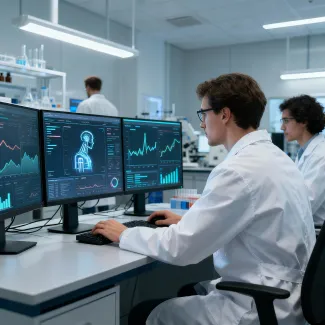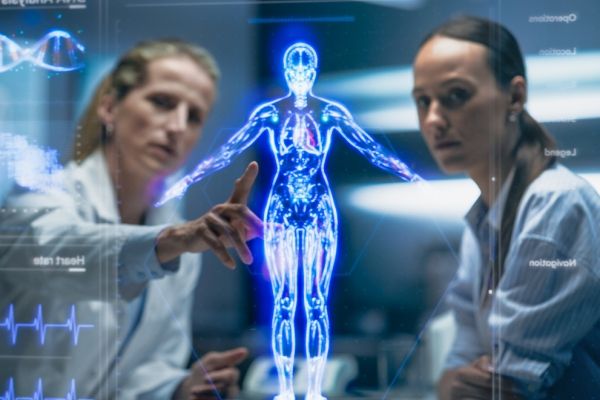
Regulatory science: the science behind safe and reliable health innovations
Regulatory science is the science of developing new tools, standards, and approaches to assess the safety, efficacy, quality, and performance of regulated products. VITO supports the health industry, regulators, and regulatory experts through regulatory science by providing targeted services that improve adoption and safety of drugs and medical devices (with a focus on AI based medical device software) in clinical practice.
The challenge
Software companies active in the Healthcare domain face a double challenge in Europe: navigating an increasingly complex regulatory landscape and earning the trust of clinical end-users. Under the EU Medical Device Regulation (MDR) and the new AI Act, most AI-based health tools are classified in risk categories, which mandates stringent conformity assessments, technical documentation, and ongoing post-market surveillance before a CE mark is granted, significantly raising the bar for certification and slowing time-to-market.
Successful compliance requires rigorous validation of data quality, transparency about how algorithms work, robust risk management systems, and guarantees of human oversight, all while keeping pace with evolving requirements for both software and AI components (when applicable).
In practice, this means not only proving clinical safety and efficacy during development, but also continuously monitoring real-world performance and updating the software, a particular challenge for adaptive and learning systems.
Beyond regulatory hurdles, trust remains an issue in everyday practice: clinicians and patients are wary of “black-box” algorithms, data privacy risks, and the lack of established best practices for integrating AI into diverse workflows, underscoring the need for clear communication, transparency, and external validation to foster genuine trust in real clinical settings.
Our solutions
VITO supports the health industry, regulators, and regulatory experts through regulatory science by providing targeted services that improve adoption and safety of software technologies (including AI based technologies) in clinical practice.
Regulatory and AI Evaluation Trainings
VITO offers specialised training programmes for notified bodies, regulators, medical AI industry, and regulatory experts to deepen their understanding of AI evaluation, bias, fairness, robustness, and European regulatory requirements for medical AI. These courses focus on advanced topics such as metric selection, explainability, and best practices, enabling participants to make well-informed and consistent regulatory and AI evaluation decisions.


Support with the Technical Performance Evaluation of AI Products
VITO partners with companies and assessment bodies to rigorously test and benchmark AI-based medical devices, both in controlled settings and using real-world data. This support includes standardising data, providing performance analysis tools, and interpreting results in line with the latest regulatory frameworks, so manufacturers can demonstrate trustworthy and robust performance before market entry.
Automated (AI) Software Performance Monitoring Solutions
VITO develops automated monitoring systems that continuously track the real-world performance of (AI) systems post-deployment. These tools ensure that AI algorithms remain safe and effective over time, quickly detecting drops in accuracy or problems resulting from data drift or system updates.


Research into Trustworthy (AI) Technologies for Clinical Practice
VITO leads research into novel AI methodologies such as tools for data anonymisation, creation of synthetic data for fine grained evaluations, and explainable AI, to increase trust, transparency, and fairness of AI in healthcare settings. These innovations set the foundation for safer, more ethical AI integration and guide the industry's and policymakers’ adoption of best practices.
Why VITO?
VITO is an independent applied research organisation in Flanders, Belgium. At VITO, our aim is a society where sustainability is the norm. We create innovative technological solutions and actively share our knowledge with academics, businesses and government bodies. In the domain of Sustainable Health, VITO is active in three domains: Data Driven Health & Prevention, Human Biomonitoring and Diagnostics.

VITO's labs in the Earth building
VITO's Digital Bio Systems (DBS) experts have a strong background in the creation of digital twins and regulatory science. The team has +10 years of experience with the creation of deep learning models for medical diagnosis and prognosis. This research has led to success stories such as the creation of the spin-off company MONA, offering CE certified automated medical devices for the detection and follow-up of retinal diseases.
Our experts have +5 years experience in the regulatory science domain, researching technological solutions which allow to better evaluate, and guarantee the actual model performance obtained in the clinical practices at all moments in time. We are working on those in the context of a wide range of European projects. Some example projects are presented below.
Our projects
BRIDGE
Breakthrough Regulatory Innovation and Development throuGh sandbox Environments (2025-2028), IHI
VITO leads the BRIDGE project to reshape the future of health regulation in Europe together with its project partners. Bringing together regulators, researchers, industry and patient representatives, the project is developing a framework for “regulatory sandboxes”, safe, real-world test environments for innovative health technologies. This enables new digital solutions and advanced therapies to reach patients faster, more safely and with stronger evidence, to the benefit of people and health systems across Europe.
NoBoCap
Notified Body Increased Capacity (2023-2026), EU4Health
The NoBoCap project is an EU initiative aimed at enhancing the efficiency of Notified Bodies (NB) and Market Operators in the Medical Technology (MedTech) sector. It focuses on streamlining the regulatory process for medical devices, facilitating quicker market access for innovative health solutions. By fostering collaboration among stakeholders, NoBoCap aims to bridge gaps in dossier submissions and approvals, ultimately promoting health technology innovation across Europe. VITO delivers “The NoBoCap short course on Performance evaluation of AI-based MDSW” to NB’s, health industry, regulatory experts, and regulators.
E-CLAIR
Efficiency and Cost-effectiveness of AI-based Diabetic Retinopathy Screening in Flanders (2021-2024), Koning Boudewijnstichting
The E-CLAIR project aims to develop a cost-effective, AI-assisted diabetic retinopathy (DR) screening workflow tailored for Flanders. It evaluates and compares the performance and cost-effectiveness of AI-based DR screening workflows versus the current approach. VITO co-led the E-CLAIR project and was responsible for the performance and cost-effectiveness evaluations.
VIVALDY
Verification and Validation of AI-enabled Systems (2020-2023), PENTA
The VIVALDY project aimed to create efficient re-verification, re-validation methods, and regulatory approval guidelines for incremental upgrades of AI-enhanced Cyber-Physical Systems (CPSs) in healthcare. It focused on enabling more frequent system and module upgrades while ensuring safety and effectiveness. The project analysed user data, impact, and testing to deliver demonstrators and guidelines applicable to safety-critical industries. VITO developed tools for the fine grained evaluation and monitoring of AI-based MDSW performance.
REALM
Real-world-data Enabled Assessment for heaLth regulatory decision-Making (2023-2027), Horizon Europe
The REALM project is an interdisciplinary initiative aimed at developing a collaborative framework for the evaluation of innovative medical device softwares. It focuses on methodologies, algorithms, and tools to enhance the adoption of AI-driven healthcare software while addressing regulatory barriers and guaranteeing patient safety. VITO is co-lead of REALM, and develops tools and methodologies to evaluate the performance, trustworthiness, and regulatory compliance of AI-based Medical Device SoftWare (MDSW).
RAIDO
Reliable AI and Data Optimization (2024-2026), Horizon Europe
The RAIDO project aims to establish a comprehensive framework for Trustworthy and Green AI. It incorporates automated data curation and utilises decentralised blockchain technology to ensure transparency and accountability. The project seeks to enhance the sustainability of AI while maintaining high ethical standards. VITO’s role in RAIDO is to lead efforts in ensuring privacy-compliant AI development, responsible data management, and regulatory alignment.
TEF-Health
Testing and Experimentation Facility for Health AI and Robotics (2023-2028), Digital Europe
The TEF-Health project is a European initiative aimed at enhancing the integration of artificial intelligence (AI) and robotics in healthcare. With a commitment of €60 million, it focuses on developing testing and experimentation facilities to support innovation in these technologies. The project seeks to improve healthcare delivery and patient outcomes through advanced technological solutions. VITO offers its services to SME’s in Europe in the TEF-Health.
Would you like to know more?
Are you curious about how VITO's expertise in regulatory science can help you? Feel free to contact Bart Elen and his colleagues at regulatoryscience@vito.be.
Regulatory science is the science that develops new tools, standards and methodologies to assess the safety, efficacy, quality and performance of regulated products.
VITO supports the health industry, regulatory bodies and experts through regulatory science by providing targeted services that improve the adoption and safety of (AI) software technologies in clinical practice.
Software companies active in healthcare face a double challenge in Europe: navigating an increasingly complex regulatory landscape and gaining the trust of clinical end users.
Under the EU Medical Device Regulation (MDR) and the new AI Act, most AI-driven healthcare solutions are classified into risk categories. On top of that, software companies must keep pace with evolving requirements for both software and AI components. In addition to regulations, the trust of clinicians and patients also plays a crucial role.
VITO supports the healthcare industry, regulatory bodies and experts through regulatory science by providing targeted services that improve the adoption and safety of (AI) software technologies in clinical practice. We do this by:
- Training courses in regulation and AI evaluation
- Support with technical performance evaluation of AI products
- Automated monitoring of (AI) software performance
- Research into reliable (AI) technologies for clinical use




